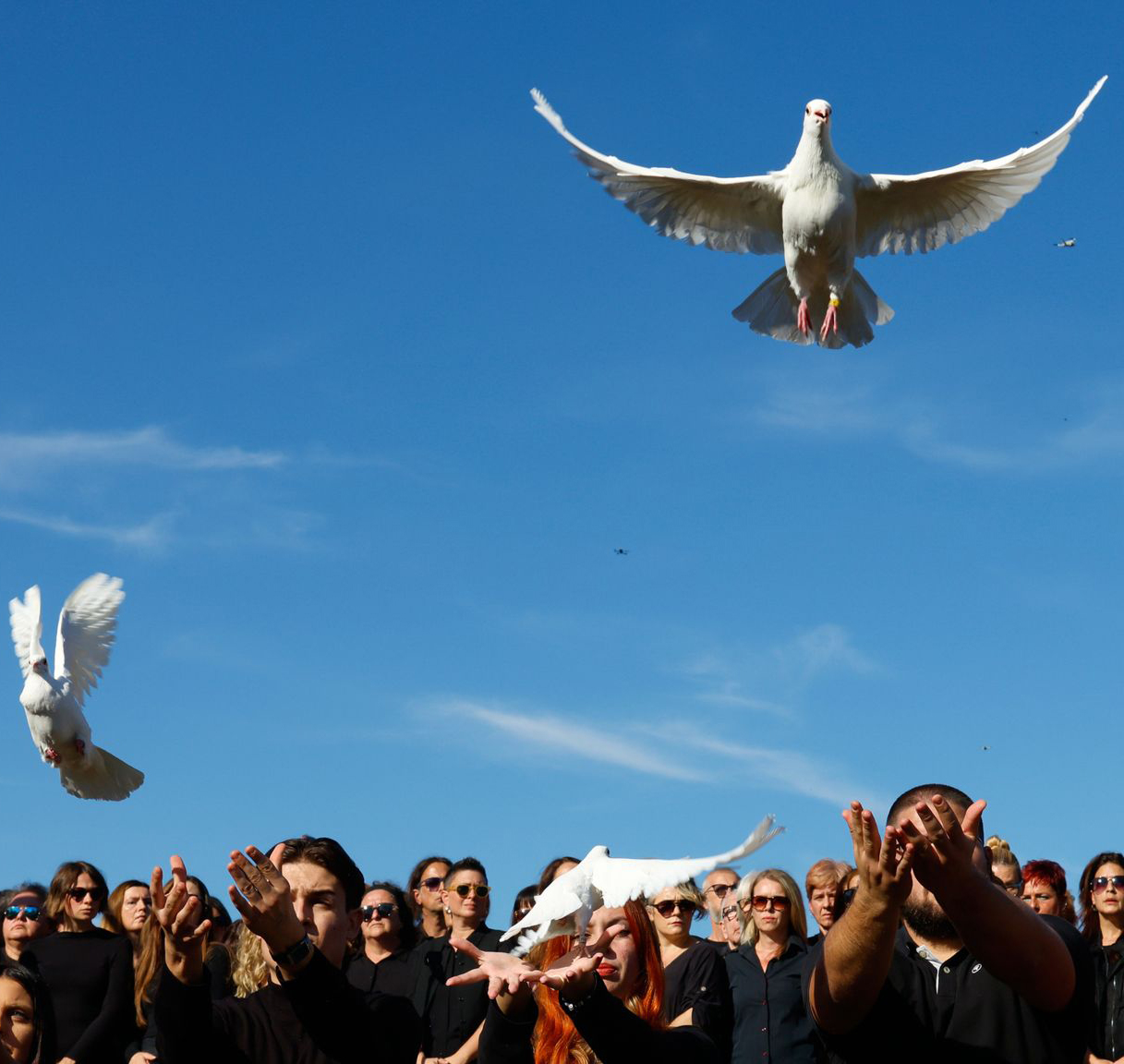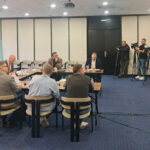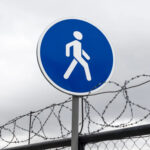- Anniversary of the Tragedy in Novi Sad: The “Color Revolution” Did Not Happen
At 11:52 a.m. on November 1, in the city of Novi Sad, tens of thousands of people from all over Serbia, at the call of students, held a 16-minute silent memorial to honor the memory of 16 people who died as a result of the collapse of the concrete canopy of the city’s railway station a year ago.
The Government of Serbia decided to declare November 1 a Day of mourning to mark the anniversary of the tragedy. Throughout Serbia, memorial events were also held in major cities in honor of the victims. In many cities abroad, from Utrecht to Zagreb, the Serbian diaspora also organized commemorations for those killed in the collapse of the canopy at the Novi Sad station.
The state leadership took part in the liturgy for the deceased in Belgrade, at the Temple of Saint Sava, which was conducted by the Patriarch of the Serbian Orthodox Church.
The commemorative event in Novi Sad on November 1 proceeded peacefully and without any incidents, despite warnings from the country’s leadership—above all, President Aleksandar Vučić—about the protesters’ alleged preparations for a “color revolution” “with the support of the EU.”
On the eve of the anniversary, President Vučić addressed the citizens, calling for dialogue. “Many have broken the rules and committed violence against the state and others’ property. Just as some have expressed anger, I also regret some of the things I said. I apologize for that,” Vučić stated.
The students responded that if the president’s apology was sincere, he should call early parliamentary elections, which they have been demanding for several months.
Dijana Hrka, the mother of Stefan Hrka, who died as a result of the collapse of the railway station canopy, in her speech in Novi Sad, called on the authorities to conduct an investigation, punish the guilty, call early elections, and announced that she was starting a hunger strike.
On November 2, protesters gathered in the center of Belgrade in support of Dijana Hrka, who declared a hunger strike near the tent camp by the parliament building, which has been occupied by Vučić’s supporters since March. The action turned into a confrontation between two camps, involving several thousand people. Hundreds of police officers in full gear separated the protesters and government supporters, who threw bottles and flares at each other.
Commenting on the commemorative gathering in Novi Sad on November 1 and the unrest in Belgrade on November 2, Vučić stated that the “color revolution failed,” and now among the protesters reigns “nervousness and hysteria because of the fiasco.” In a TV interview on November 3, he also said that “two snipers” were currently in Belgrade, hinting that those seeking a “color revolution” were behind them, since “they cannot defeat him in elections.”
“We are now hunting two snipers in Belgrade, whom we know are in the city, but we have not been able to find them for three days. But we know they arrived, we know where the money came from, we know the targets. I believe the competent service will be able to resolve this issue. So that is their only path. There is no other path. They cannot shake my will; they cannot defeat me in elections, and they know it very well, no matter when or under what circumstances the elections take place,” Vučić stated.
- The UN Security Council Extended the Mandate of the EUFOR Althea Mission in Bosnia and Herzegovina
The UN Security Council unanimously adopted Resolution 2795 (2025), extending the mandate of the stabilization forces under the leadership of the European Union in Bosnia and Herzegovina—EUFOR Althea—until November 2, 2026.
Russia did not veto the extension of the mission, as had previously been predicted.
Changes in Moscow’s policy occurred a few days before the UN Security Council vote. This became known after the meeting between the former President of Republika Srpska, Milorad Dodik, and Russian Foreign Minister Sergey Lavrov in Minsk. After the conversation with Lavrov, Dodik announced that an agreement had been reached with the Russians on the extension of the Althea mission’s mandate.
Previously, the leader of the Bosnian Serbs actively advocated for the termination of the EU mission, calling it an “occupation” and claiming that Russia would vote against the extension of the EUFOR mandate in Bosnia and Herzegovina. However, his position—and that of the Bosnian Serbs as a whole—changed radically in recent weeks, when Republika Srpska revoked all disputed laws and decrees aimed at non-recognition of the central authorities of BiH and the High Representative of the international community.
The reason for Dodik’s and the RS leaders’ change of position is believed to be their agreements with the United States. Evidence of such agreements is seen in the recent decision of the U.S. Department of the Treasury to remove from the sanctions list both the former President of Republika Srpska Milorad Dodik and members of his family, as well as the Serb member of the Presidency of Bosnia and Herzegovina Željka Cvijanović, Speaker of the National Assembly of Republika Srpska Nenad Stevandić, and other individuals and legal entities from RS.
- Montenegro Introduced Visas for Turkish Citizens
On October 27, the Government of Montenegro suspended the visa-free regime for citizens of Turkey, which had been introduced in 2008. The decision came into effect on October 30. Montenegrin authorities explained this move as necessary to harmonize the country’s visa policy with EU requirements. However, in fact, the decision was prompted by a conflict between residents of Podgorica and Turks living in the Montenegrin capital.
The unrest began on October 26, when a Montenegrin was stabbed during a fight in the Podgorica district of Zabjelo.
Two persons—citizens of Turkey (according to other reports, citizens of Turkey and Azerbaijan)—were promptly detained on suspicion of committing the attack. However, on October 31, the High Court in Podgorica announced their release after it was established that they were not involved in the incident. The court’s statement said that surveillance camera footage confirmed the suspects were at home at the time of the attack.
During other raids, police temporarily detained more than 40 other citizens of Turkey (and, according to some reports, Azerbaijan). The official statement said that as a result of the police operation, eight people were deported and seven were fined.
The attack on a Montenegrin in Podgorica triggered protests that continued for several days after the incident. In the capital, marches and rallies were organized, during which participants chanted anti-Turkish slogans. A wave of attacks swept through Montenegrin cities, targeting property belonging to Turkish citizens (cars, shops, cafés).
The introduction of visas for Turkish citizens was meant to calm Montenegrin citizens and prevent a deterioration of the security situation. However, according to forecasts, the sudden introduction of a visa regime with Turkey will negatively affect Montenegro’s economy.
According to media reports, over the past eight months, Turkish citizens accounted for the largest share of foreign investment in Montenegro—over 92 million euros. This represents one-fifth of the total foreign investment. Turkish firms are the main investors in the country’s real estate and hotel industries. The Turkish Cooperation and Coordination Agency (TIKA) has also made significant investments.
Turks own 14,500 companies in Montenegro—every fifth one. Of the 2.8 million passengers handled by Montenegro’s two airports (Podgorica and Tivat) last year, one-fifth, i.e., 560,000, were in connection with flights between Montenegro and Turkey.
On the first day of the visa introduction, no more than 40 passengers arrived on flights from Turkey to Montenegrin airports. The previous average was 150.
- The Ruling Coalition Convincingly Won Local Elections in North Macedonia
The coalition led by the ruling VMRO–DPMNE party and its partners—the Albanian coalition VLEN (VREDI) and ZNAM—won a decisive victory on October 19 and November 2, gaining control over most cities and municipalities (communes) in the country.
VMRO–DPMNE won the mayoral elections in 55 out of 81 municipalities, including the capital. In Skopje, Orce Gjorgievski of VMRO–DPMNE led his opponent Amar Mečinović from Levica by about 20%.
The opposition Social Democratic Union of Macedonia (SDSM) suffered a crushing defeat, winning mayoral seats in only six municipalities. In 2017, the then-ruling SDSM had won 57 mayors, while VMRO–DPMNE only five.
VLEN (VREDI) won in nine municipalities.
According to observers, VLEN’s victory marked “the end of the Ahmeti era,” referring to the long-standing dominance of Ali Ahmeti’s Democratic Union for Integration (DUI) in the political representation of Albanians. DUI, which led the “National Alliance for Integration” coalition in these elections, won only four mayors.
ZNAM remains in charge of local governance in the country’s largest municipality, Kumanovo.
The local elections on October 19 and the second round on November 2 were the eighth since North Macedonia’s independence in 1991. They took place less than two years after the parliamentary elections in which VMRO–DPMNE, after seven years in opposition, returned to central power, forming a coalition with VLEN and ZNAM. Accordingly, SDSM and its partner DUI are now in opposition at the central level.
The results of the 2025 local elections demonstrated that voters’ sentiments have not changed.
Now, the ruling coalition led by VMRO–DPMNE holds even greater power, not only at the center but also locally, “from European integration to sewerage,” as one analyst noted.
- Syria Recognized Kosovo
President of Kosovo Vjosa Osmani announced that the Syrian Arab Republic has officially recognized the independence of the Republic of Kosovo.
The recognition agreement was reached on Wednesday, October 29, during a meeting in Riyadh, the capital of Saudi Arabia.
Osmani wrote on Facebook that the recognition took place through the mediation and with the support of the Crown Prince of Saudi Arabia, Mohammed bin Salman Al Saud.
The recognition was also confirmed by the Ministry of Foreign Affairs of Syria.
“The Syrian Arab Republic declares the recognition of the Republic of Kosovo as an independent and sovereign state, based on the principles of the Charter of the United Nations and its decision to strengthen the principles of peace and stability in the region and in the world,” stated the MFA in a declaration published on social network X.
Syria became the 120th UN member state to recognize Kosovo’s independence. The last country to do so before Syria was Sudan (April 12), and before that Kenya (March 26).
Previously, Serbia had actively worked to secure the withdrawal of recognition of Kosovo by countries in Asia and Africa, but this process has now practically stopped.
- Croatia and Ukraine Agreed to Deepen Defense-Industrial Cooperation
Deputy Prime Minister and Minister of Defense of Croatia Ivan Anušić and Minister of Defense of Ukraine Denys Shmyhal signed a Letter of Intent on deepening defense-industrial cooperation during a meeting in Kyiv.
“This document lays the foundation for future joint projects that will contribute to the development and strengthening of the Croatian and Ukrainian defense industries. The experience that Ukraine is gaining in modern warfare is extremely valuable for the entire world, including Croatia,” said Minister Anušić.
The Letter of Intent is not a legally binding document between the participants, and any financial or other obligations will require separate agreements based on the approval procedures of the participants and their governments. Ukraine has already signed similar Letters of Intent under its defense industry support program called “Build with Ukraine” with several EU member states.
“Since the beginning of Russian aggression, Croatia has supported Ukraine’s struggle for freedom, independence, and democracy. Croatia went through the same war ordeal as Ukraine; we understand what you are going through. Through your struggle and resistance, you are keeping the war away from the borders of the European Union, and for this reason, the EU, as well as Croatia, must support Ukraine, because the Ukrainian people are practically fighting for all of Europe,” said Minister Anušić.
The Croatian Defense Minister announced the 14th assistance package and the 15th by the end of this year.
- Investigative Journalists Uncovered a Network for Recruiting Mercenaries for the Russian Army
Russian mercenaries with years of experience are recruiting citizens of Serbia and Bosnia and Herzegovina to join the Russian army on the Ukrainian front, reported the Balkan Investigative Reporting Network (BIRN).
Journalists discovered that citizens of both countries are being actively recruited into the Russian army through the Telegram platform. BIRN noted that at least two well-known mercenaries have been identified as recruiters—Dejan Berić and Davor Savičić. Both have fought on the side of pro-Russian forces since 2014.
Reports about Balkan mercenaries in the Russian army have been appearing since the annexation of Crimea in 2014 and continue after the start of Russia’s full-scale invasion of Ukraine in 2022. Although participation in armed conflicts abroad is illegal in Serbia (punishable by two months to ten years of imprisonment) and in Bosnia and Herzegovina (two months to eight years), dozens of citizens of these countries continue to join Russian forces.



